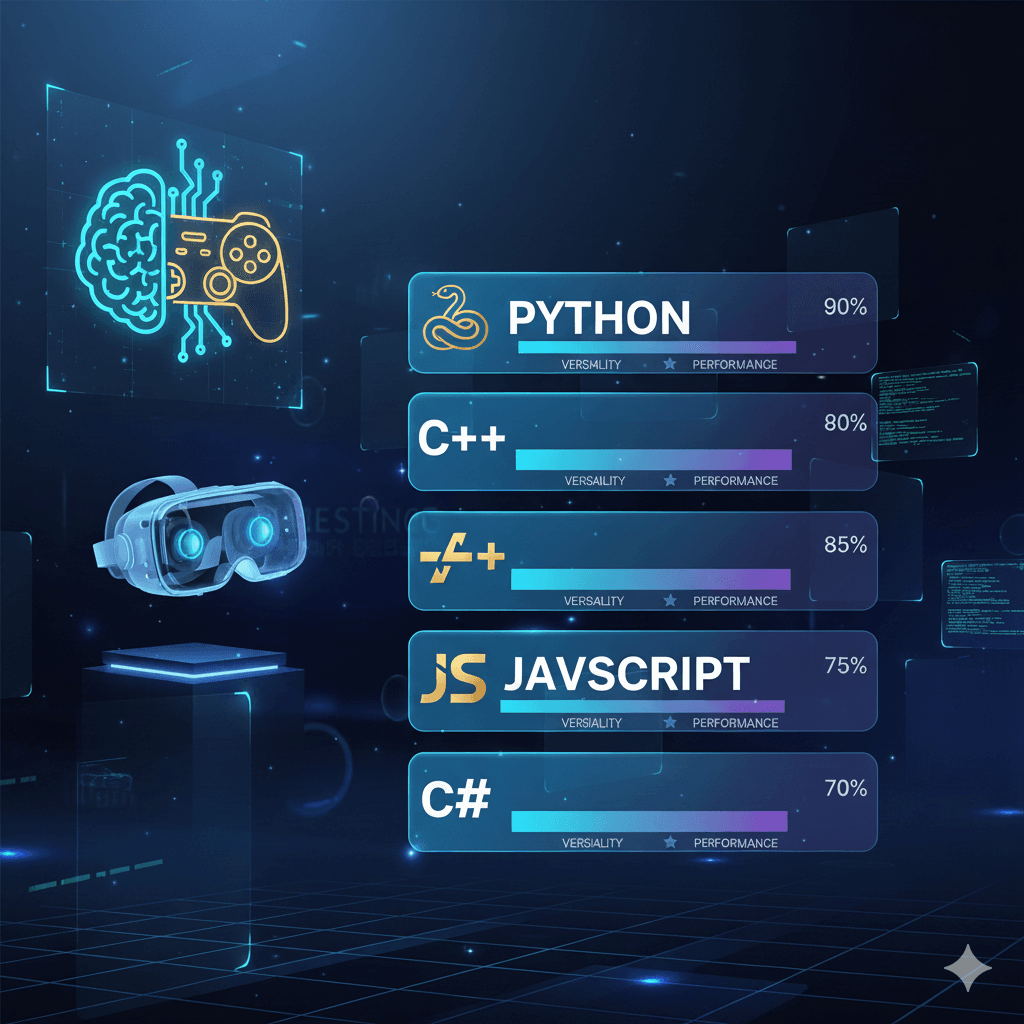Artificial Intelligence (AI) is reshaping the gaming industry—making games more interactive, realistic, and immersive. Whether it’s smarter NPC behavior, advanced physics, adaptive learning, or procedural content generation, AI is transforming how games are built and experienced.
But which programming languages are best suited for AI-based game development?
Let’s explore the top languages that power modern AI-driven games and why they matter.
Why AI Matters in Game Development
AI enhances gaming by:
- Creating intelligent NPCs
- Building adaptive gameplay
- Generating new environments
- Enhancing player experiences
- Improving pathfinding & decision-making
From chess engines to story-driven RPGs, AI is everywhere in modern games.
Top Programming Languages for AI Game Development

1. Python
Python is the most popular language for artificial intelligence thanks to its simplicity and vast libraries.
Why Use Python for AI Gaming:
- Easy to learn
- Massive support for machine learning & deep learning
- Perfect for prototyping AI logic
Popular Libraries:
- TensorFlow
- PyTorch
- Scikit-learn
- NumPy
Python is ideal for building AI models that can later be integrated into other game engines.
2. C++
C++ is the backbone of the gaming industry. Many AAA games are built with C++ because it delivers high performance and low-level memory control.
Why Use C++ for AI Gaming:
- Fast execution—best for real-time simulations
- Compatible with major game engines
- Used for performance-critical AI logic
Popular Engines:
- Unreal Engine
- CryEngine
If you’re developing large 3D games requiring real-time AI, C++ is the top choice.
3. C#
C# is popular because of Unity, one of the most widely used game engines.
Why Use C# for AI Gaming:
- Excellent engine support (Unity)
- Easy to implement AI behaviors
- Beginner-friendly
AI in C#:
- Good for decision-making systems
- Pathfinding (A* algorithm)
- NPC movement & behavior trees
Perfect for indie game developers and mobile game AI.
4. Java
Java offers platform independence and is used in mobile and multiplayer games.
Why Use Java for AI Gaming:
- Object-oriented
- Runs on multiple platforms
- Strong memory management
AI Features:
- Good for basic AI logic
- Supports large-scale online games
Java is widely used in Android game development and AI-based game systems.
5. JavaScript
JavaScript powers browser-based games, and it can integrate AI modules built using Python or WebAssembly.
Why Use JavaScript for AI Gaming:
- Great for web games
- Easy integration with ML frameworks
- Supported by modern engines
Libraries:
- TensorFlow.js
- Brain.js
Best choice for lightweight and browser AI games.
6. Lua
Lua is a lightweight scripting language commonly used for in-game AI logic.
Why Use Lua for AI Gaming:
- Fast execution
- Easy to embed
- Excellent for scripting NPC behavior
Used in:
- Roblox
- World of Warcraft
- CryEngine
Lua is ideal for scripting AI and building logic for NPCs efficiently.
7. R (For Data-Driven AI)
While not a game development language, R is helpful for building statistical models and analytics for AI.
Best Uses:
- Predictive models
- Pattern recognition
R is rarely used directly in games, but helpful for creating AI models applied elsewhere.
Which Language Should You Choose?
| Language | Best For | Difficulty |
|---|---|---|
| Python | AI algorithms, ML, fast prototyping | Easy |
| C++ | AAA games, high-performance AI | Hard |
| C# | Unity games, NPC behaviors | Medium |
| Java | Mobile & online games | Medium |
| JavaScript | Browser games & simple AI | Easy |
| Lua | Game scripting | Easy |
Best Game Engines for AI Development
| Engine | Languages Used |
|---|---|
| Unity | C# |
| Unreal | C++ |
| Godot | C#, GDScript |
| CryEngine | C++, Lua |
Future of AI in Gaming
AI will continue to grow and redefine gaming through:
Procedural world generation
Smarter NPCs
Personalized gameplay
Improved simulations
Real-time learning models
From realistic open-world environments to intelligent enemies, AI is opening unlimited possibilities.





